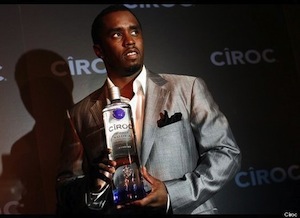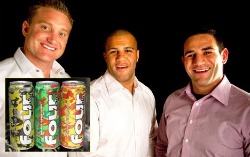In the Doghouse
Search
In the Doghouse
Hot in Hollywood: Celebs Shilling for - and Owning - Alcohol Brands
- Details
- Published: Monday, March 18 2013 16:55
 March 18, 2013
March 18, 2013The latest hot trend among Hollywood's biggest names is not launching their own perfume or creating a designer collaboration at Target - it's much more dangerous than that. No, the latest Hollywood phenomenon is celebrity-branded booze. From liqueur to limoncello, wine to whiskey - it seems like everyone who is anyone is jumping on the booze train.
The trend spans all sectors of the entertainment industry. Musicians seem to lead the way, with entertainers as diverse as Hanson (MMMHop IPA), Sean Combs (Ciroc Vodka), Willlie Nelson (Whiskey River Bourbon), Ludacris (Conjure Cognac), Marilyn Manson (Mansinthe), Justin Timberlake (901 Silver Tequila) all shilling for brands. Actors like Dan Ackroyd (Crystal Head Vodka) and Danny Devito (Danny DeVito Limoncello) have gotten into the game. Media and reality television stars like Donald Trump (Trump Super Premium Vodka) and Bethenny Frankel (Skinny Girl Cocktails) can't be left out. Even the fashion set is throwing their hats in the ring as Roberto Cavalli has done with his namesake vodka. Not to be left out, professional sports stars are now starting brands as well. Basketball start Yao Ming now owns Yao Family Wines, which operates in China.
The ownership arrangements of these brands are as diverse as the celebrities themselves. Some lend their name and time to promoting them in return for a big paycheck, as Snoop Dogg does with Blast by Colt 44 (Pabst). Some own the companies outright, like Justin Timberlake and Roberto Cavalli. Some even share ownership of their brands with Big Alcohol heavyweights, like P. Diddy's 50-50 ownership split of Ciroc with Diageo. In the end, some sell their alcohol company in its entirety to a Big(ger) Alcohol corporation, the way Bethanny Frankel did with Skinnygirl (sold to Beam Global in 2011) and Sammy Hagar did with his Cabo Wabo Tequila (sold to Campari/Skyy in 2009).
The phenomenon of celebrity entertainers promoting alcohol brands is clearly dangerous to public health. Celebrities send the message that alcohol is cool, sexy, and socially desirable. As public figures, celebrities are admired and celebrated by their many fans, many of whom are children. And when celebrities own alcohol brands, and sell those brands to bigger alcohol corporations for millions, it sends an even worse message. That is one true Hollywood story without a happy ending in sight.
Four Loko Frat Boys Spanked by FTC
- Details
- Published: Thursday, February 21 2013 14:11
February 21, 2013
 Phusion Projects is by no means new to the Doghouse - the company's been put in here several times before for its deceptive marketing, youth-oriented approach, and avoidance of regulators (let's not forget its harmful caffeinated alcohol products). Last week, Phusion was reprimanded by the FTC for "falsely claiming that a 23.5-ounce can of Four Loko contains the alcohol equivalent of one or two regular 12-ounce beers, and that a consumer could drink one entire can safely on a single occasion."
Phusion Projects is by no means new to the Doghouse - the company's been put in here several times before for its deceptive marketing, youth-oriented approach, and avoidance of regulators (let's not forget its harmful caffeinated alcohol products). Last week, Phusion was reprimanded by the FTC for "falsely claiming that a 23.5-ounce can of Four Loko contains the alcohol equivalent of one or two regular 12-ounce beers, and that a consumer could drink one entire can safely on a single occasion."
The FTC ruling gives Phusion six months to put an Alcohol Facts panel showing the container size, percentage alcohol by volume, number of servings in the container, and serving size in fluid ounces, on containers of Four Loko and any other flavored malt beverage containing more than two servings of alcohol. Phusion also has to make resealable containers for any of its products that contain more than two and a half servings of alcohol (something Phusion said it would do back when the agreement was originally proposed in 2011, but hasn't since implemented without a little push from the FTC).
 Phusion Projects is by no means new to the Doghouse - the company's been put in here several times before for its deceptive marketing, youth-oriented approach, and avoidance of regulators (let's not forget its harmful caffeinated alcohol products). Last week, Phusion was reprimanded by the FTC for "falsely claiming that a 23.5-ounce can of Four Loko contains the alcohol equivalent of one or two regular 12-ounce beers, and that a consumer could drink one entire can safely on a single occasion."
Phusion Projects is by no means new to the Doghouse - the company's been put in here several times before for its deceptive marketing, youth-oriented approach, and avoidance of regulators (let's not forget its harmful caffeinated alcohol products). Last week, Phusion was reprimanded by the FTC for "falsely claiming that a 23.5-ounce can of Four Loko contains the alcohol equivalent of one or two regular 12-ounce beers, and that a consumer could drink one entire can safely on a single occasion." The FTC ruling gives Phusion six months to put an Alcohol Facts panel showing the container size, percentage alcohol by volume, number of servings in the container, and serving size in fluid ounces, on containers of Four Loko and any other flavored malt beverage containing more than two servings of alcohol. Phusion also has to make resealable containers for any of its products that contain more than two and a half servings of alcohol (something Phusion said it would do back when the agreement was originally proposed in 2011, but hasn't since implemented without a little push from the FTC).
Accurate labels on all alcoholic beverages - beer, wine, spirits, and alcopops alike - should have been placed on the containers decades ago. Resealable containers are barely a bandage on a much larger wound - there is no evidence that resealable containers of youth-oriented, high-ABV alcopops will discourage dangerous binge drinking and the harm that results. These two steps won't get these deadly products off the shelves of convenience, grocery, and neighborhood corner stores. Phusion will still produce supersized products that contain extreme amounts of alcohol per container and are clearly designed to be bright, exciting, and attractive to kids.
Despite the action taken by the FTC, more meaningful change is still necessary for Phusion, other alcopops producers, and the rest of the industry. Diageo hailed the FTC ruling immediately after the story broke, with Distilled Spirits Council of the U.S. (DISCUS) following along in agreement. When Diageo North America EVP Guy L. Smith - the guy who coined the term "serial alcophobe" to insult professionals who advocate for population-based alcohol policy that actually reduces alcohol-related harm - hails a decision, it doesn't bode well for public health.
Vaportini: Drunk on Fumes?
- Details
- Published: Tuesday, January 29 2013 12:37
January 29, 2013
It's like something out of a bad 70's sci-fi flick: a product called the "Vaportini," Chicago bar owner Julie Palmer's new brainchild, bypasses pouring and swallowing and lets people inhale alcohol vapors through a straw.
It's like something out of a bad 70's sci-fi flick: a product called the "Vaportini," Chicago bar owner Julie Palmer's new brainchild, bypasses pouring and swallowing and lets people inhale alcohol vapors through a straw.
Really?
The device heats spirits into vapors for users to inhale, rather than drinking the alcohol out of a glass. The concept - not unlike smoking heroin or crack cocaine - allows would-be drinkers to consume alcohol while simply breathing. The implications are obviously stark. Alcoholic vapors filling the air make it much harder for drinkers to track how much they've ingested, and much harder to avoid second-hand smoke effects that could impair other individuals without their knowledge or consent.
The product's website claims that it makes it easier to "responsibly imbibe." The website also calls the ingestion process "simple, natural and enjoyable," and says "the effects are felt immediately because the alcohol is going directly through the bloodstream. Most people experience a relaxed and mellow feeling." The Federal Trade Commission should review the Vaportini marketing materials, including web content, to ensure they don't promote misleading or deceptive claims about the product's advantages and effects.
Ultimately, the product may be a big flop at the hands of drinkers who see no need for this gimmick. Other products that allowed people to inhale alcohol have come and gone, and many states have banned devices that vaporize alcohol. But just a few states have language that could include this type of product. Oklahoma and Missouri are two examples of states with laws that do not allow devices like the Vaportini. Lawmakers should propose language to address this problem in their home states immediately.
The list of ways that alcohol contributes to harm and costs for that harm is already long enough - Inhaling alcohol doesn't need to shoot to the top, or even make the list at all.
More Articles ...
Help us hold Big Alcohol accountable for the harm its products cause.
| GET ACTION ALERTS AND eNEWS |
STAY CONNECTED    |
CONTACT US 24 Belvedere St. San Rafael, CA 94901 415-456-5692 |
SUPPORT US Terms of Service & Privacy Policy |
Copyright © 2024 Alcohol Justice. All Rights Reserved.
Joomla! is Free Software released under the GNU General Public License.


